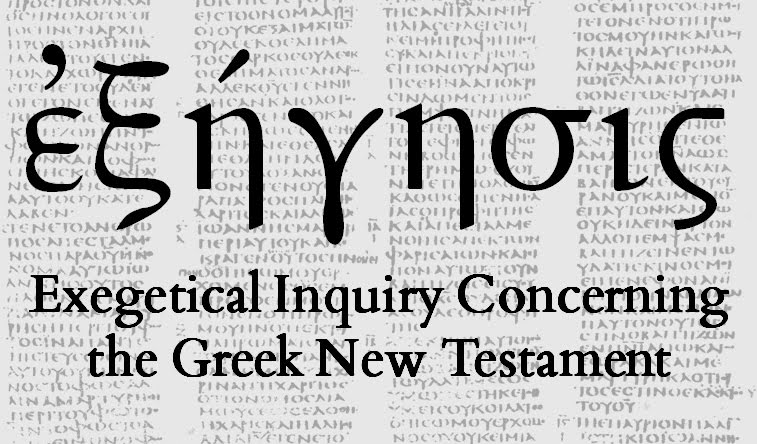Monday, October 14, 2013
Gentle Reformation Interview on Warnings and Exhortations
Tuesday, March 26, 2013
We Write to be Assured that We are not Alone
Tuesday, February 19, 2013
Emmanuel, God with Us, in The Gospel of John
Everyone who has heard the Christmas story knows that one of the titles given to the child, Jesus, is Ἐμμανουήλ, Emmanuel, which according to The Gospel of Matthew means “God with us” (1:23), in fulfillment of Isaiah 7:14. The apostle John's version of “God with us,” however, is not as well known perhaps because John does not point it out as Matthew does but also because our English translations tend to obscure John's “God with us.”
Two passages in the apostle John's writings present “God with us.” Both passages present God as “dwelling among us” in a tent or tabernacle. The first is the familiar verse of John 1:14—“And the Word became flesh and tabernacled among us, and we looked upon his glory, glory as of the one of a kind with the Father, full of grace and truth.” Familiar English translations translate the aorist verb, ἐσκήνωσεν, as “dwelt,” a legitimate translation. However, because John could have used a variety of other Greek words for “dwell,” it seems apparent that John means something more than simply “lived among us.” Because he uses a verb (σκηνόω) that has the same root derivation as the noun “tent,” John is making a strong allusion to both the “tent of meeting” (Ex. 33:7-11) and the “tabernacle” where the Lord revealed his presence among the Israelites of old.
So, what is John 1:14 telling us when he says, “And the Word became flesh and tabernacle among us”? The apostle means that the Lord no longer reveals himself in a tabernacle constructed in the wilderness or the temple built in Jerusalem but in flesh, in the man Christ Jesus. Thus, Jesus announces his riddle, “Destroy this temple and in three days I will raise it up” (John 2:19). Likewise, Jesus declares to the woman of Samaria, “The hour is coming when neither on this mountain nor in Jerusalem will you worship the Father. . . . But the hour is coming and now is when the true worshipers will worship the Father in Spirit and truth, for the Father is seeking such as these who will worship him” (John 4:21-23).
Certainly, much more could be said, but brevity calls for a short note on John’s use of the same imagery in Revelation 21:3. Here John uses both the noun, “tent” or “tabernacle” (ἡ σκηνὴ), and the verb, “will pitch a tent” or “will take up residence” (σκηνώσει). The loud voice from God’s throne announces, “Look! God’s tabernacle is with humans, and he makes his tabernacle with them, and they will be his people and God himself will be with them as their God” (21:3). Thus, in Christ Jesus, God fulfills his promise of long ago, not just through the prophet Isaiah, but also when he said through Moses, “I will set my sanctuary in their midst forever, and my place of lodging will be among them, and I will be their God, and they shall be my people” (Ex. 37:26-27).
Emmanuel (Ἐμμανουήλ), God with us, is what John means when he tells us, Καὶ ὁ λόγος σὰρξ ἐγένετο καὶ ἐσκήνωσεν ἐν ἡμῖν—“And the Word became flesh and pitched his tent among us.”
(This is a piece that I wrote as part of a package for the promotion of studying Koiné Greek at our college. I’ve not completely abandoned this blog. I’ve just become excessively occupied with off-line writing, editing, etc.)

